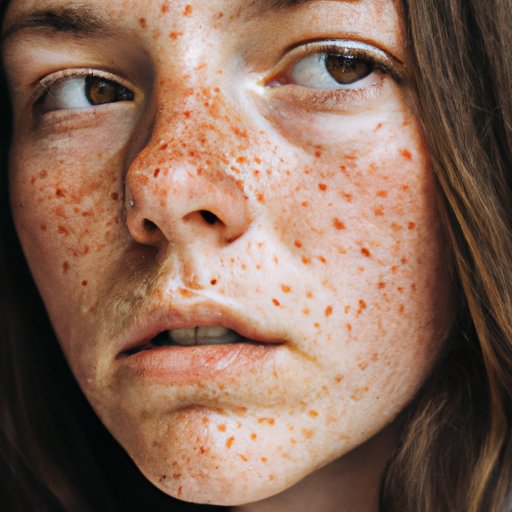
Introduction
Have you ever wondered how freckles form on your skin or why some people have more freckles than others? Freckles are a common and unique characteristic of many individuals. They add a touch of natural beauty to our faces and bodies, but where do they come from? In this article, we will explore the science behind freckle formation, the genetics of freckles, and the lifestyle factors that promote freckles. We will also discuss natural remedies for freckles, how to embrace your freckles, and the connection between freckles and skin cancer.
The Science behind Freckles – How do they Form?
Freckles are small visible spots on the skin, which are more prominent in people with fair skin. They form due to an increase in melanin, the pigment that gives color to our skin, hair, and eyes. Some people have a higher concentration of this pigment than others, which predisposes them to having freckles. However, a particular type of freckle called an ephelis is formed due to the clustering of melanin in the skin’s surface.
These ephelides are visible in areas exposed to sunlight or artificial UV light, with the face, neck, and arms being the most common areas. They typically appear after exposure to sun or artificial UV rays and tend to fade in less sunny months.
The Genetics of Freckles – Passing on the Trait
Freckles are believed to be an autosomal dominant trait, meaning that one copy of the gene from either parent is enough to produce freckles in their offspring. However, the inheritance patterns of freckles are not entirely understood, and some environmental factors can influence the expression of freckles. Therefore, not all individuals who have one parent with freckles will develop them, and those with two freckled parents may not necessarily have more freckles than those with one freckled parent.
Sun Exposure and Freckles – Exploring the Connection
Sun exposure is the primary factor that contributes to freckle formation. When we expose our skin to sunlight or UV light, the UV rays stimulate the melanocytes in our skin to produce more melanin, which darkens the skin and causes our freckles to become more prominent. Freckles are a sign of sun damage, and individuals with more freckles are at greater risk of developing skin cancer.
Lifestyle Factors that Influence Freckles – Diet and Habits
Several lifestyle factors can influence freckles’ formation. For instance, consuming a diet that is high in vitamin C can promote healthy skin and reduce the development of freckles. On the other hand, consuming a diet containing excess amounts of sugar and dairy products can stimulate hormone production, which can trigger freckles’ development.
Skin habits like smoking can also affect freckles’ formation, as cigarette smoke releases free radicals that damage the skin’s DNA and cause mutations that may lead to cancer. It is important to take care of your skin and try to maintain a healthy lifestyle to promote healthy and beautiful freckles.
Natural Remedies for Freckles – Do They Work?
Natural remedies for freckles are quite popular, with many individuals relying on them to reduce freckles’ visibility on their skin. Some of them include applying lemon juice, aloe vera gel, or honey to the skin. However, it is important to note that not all of these remedies are evidence-based, and some may even cause more harm than good. Before trying any natural remedies, it is important to consult with your healthcare provider to ensure that they are safe and effective for you.
Embracing Your Freckles – Beauty Standards and Self-Love
Freckles are unique, beautiful, and should be embraced. Unfortunately, there are beauty standards that may lead individuals with freckles to feel self-conscious about them. However, it is important to remember that beauty comes in all shapes, sizes, and colors, and freckles are just another aspect of that beauty.
To promote self-love and acceptance of freckles, individuals should work on building their self-esteem, practicing positive self-talk, and avoiding comparing themselves to others. The fashion industry and media should also increase the representation of individuals with freckles, showcasing how beautiful and unique they are.
Freckles and Skin Cancer – Understanding the Risks and Prevention
Individuals with freckles are at higher risk of developing skin cancer, especially those who have a family history of skin cancer. To reduce the risk of developing skin cancer, it is essential to practice sun protection and early detection techniques. This includes using sunscreen with a minimum SPF of 30, wearing protective clothing, avoiding tanning beds, and performing regular skin self-examinations.
Conclusion
Freckles are a unique and beautiful characteristic that many individuals possess. They may be a result of genetic predisposition, sun exposure, and lifestyle habits. While they add to the natural beauty of individuals, it is important to understand their relationship with skin cancer and take preventative measures. Embracing your freckles and promoting self-love can help you appreciate your skin and its natural beauty.




